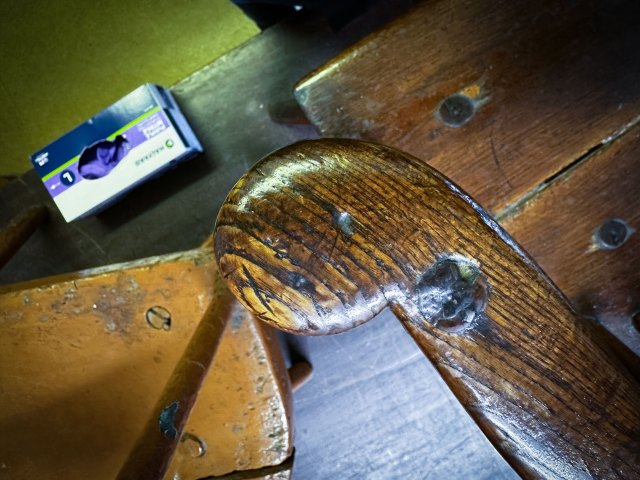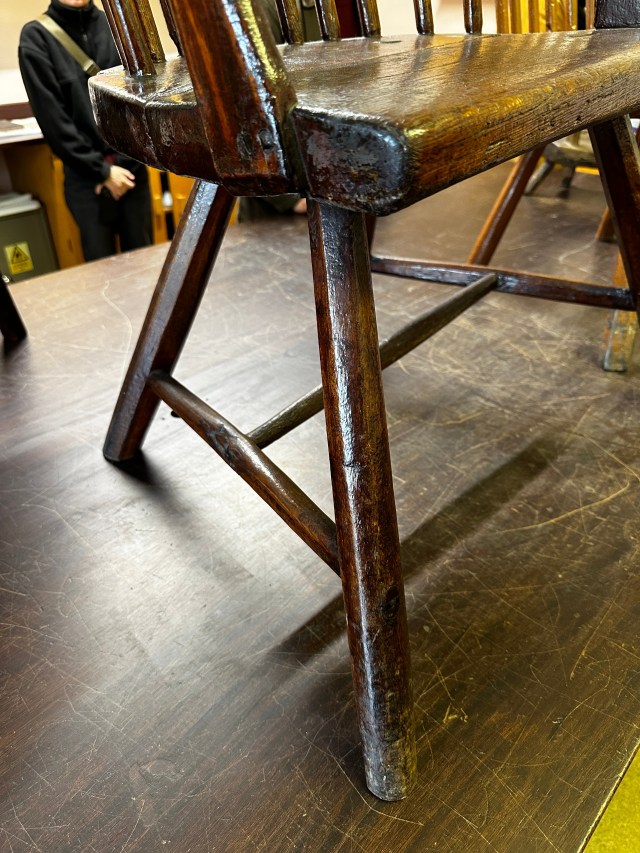
I love books, photos and drawings, but if you want to quickly learn a lot about making and designing chairs, there is one path: Study the suckers in person every chance you get. Up close and slowly.
Last week, Welsh chairmaker Chris Williams arranged for me and some friends to study four old stick chairs in the collection at the Carmarthenshire Museum. Only one of these chairs was currently on display, so it was a chance to see some chairs that aren’t in the public eye. In addition to Chris and me, we had Megan Fitzpatrick, Kale Vogt, Ryan Saunders plus Tim and Betsan Bowen of Tim Bowen Antiques. Lots of eyes, both fresh and old.
This entry is a close look at these four chairs, and some of what I learned from them. There’s no way this blog entry can replicate my in-person experience. But it’s cheaper than a trip to Wales. Note, I didn’t take measurements of these chairs, so don’t bother asking for them. For me, the proportions and angles are far more important than eighths of an inch.

Brown Comb-back
This is a massive and well-proportioned chair that has a low stance and some curious details.
Let’s start with the obvious: it has only two short sticks holding up the armbow. That’s a rare configuration for a comb-back, so we immediately took a closer look. The thick brown-yellow paint (one of several colors) didn’t show any evidence of missing short sticks. But turning the chair over showed us the truth.
Though the underside of the arm was painted, raking light from a flashlight showed evidence of at least two more sticks that were missing under each arm. This was a relief in some ways, as the single stick under the hand was tempting me to try something stupid in a future chair.

Next, we looked at the seat. Despite what I’ve seen in the past, I’m always surprised by how thick the seats on these chairs can be. I’ve seen them as thick as 3”. This one is a full 2” thick, with a generous bevel on the front of the chair that lightens the visual load (the “vertically striped shirt” of the chair world).
The seat looked like a typical D-shaped seat until we took a look from the rear of the chair. The sections of a D-shaped seat that are usually straight weren’t straight. They curved in toward the front edge of the seat.
When we looked at the shape of the armbow, this made sense. The armbow also curved inward toward the front of the chair. Many Welsh chairs begin with an arm shape, with the seat shape flowing from that. Perhaps the arm was made from a curved branch. Perhaps not. The paint wasn’t telling.
Other interesting details: The hands of the arm were not identical. This happens more than you might think. I don’t think the builder intentionally made two separate hands. I suspect that the hand shapes were determined by the wood itself, its defects or voids.

The legs were shaved round – you could still feel the facets.

My favorite part of this chair is the playful comb. Its basic shape is common: two Mickey Mouse-like ears on the ends with a raised area between them. But the chair’s builder went further. The ends have a delightful cove on the underside. And the top of the comb has a nice convex curve. The whole thing looks like a crown.

Lowback
This tidy lowback has some secrets, some of which we were able to suss out.
First, look at the front edge of the seat. Yup, that’s bark. Wide boards have always been difficult to come by, so they didn’t waste any width on this one.

The front posts were curious. They looked more English or West Country to my eye. They were joined to the chair with square mortise-and-tenon joints, while the rest of the joints in the chair were cylindrical. A close look under the arm showed us the shadow of a round mortise behind the square front posts. Likely the front posts are a replacement.
Also curious: None of the tenons for the short sticks poke through the armbow. They’re all blind. This feature is isn’t unique to this chair. It got me thinking how the mortises were drilled when the chair was built.
All the mortises through the seat were through-mortises – not blind. I think there’s a chance that some of the mortises were drilled from below the seat and then directly into the arm. The sticks all seem to lean back the same amount. So, it’s possible. Who knows?


Finally, take a look at the beautiful shoe. The detail on its ends – an ogee and fillet – are nicely proportioned. And the hands are also tidy. I think this chair was made by a skilled hand.

Unusual Child’s Chair
The third chair is one I didn’t spend much time with because of its odd construction. You see this in chairs in Ireland and Scandinavia more than Wales. I kinda wonder if it’s an import. The turned legs and insanely thick seat added to its curious stance.
I forgot to ask the curators about the provenance on this chair. Perhaps that will give us some answers.

The Best of the Bunch
The final chair in this group was my favorite (I wasn’t alone). All the details point to the fact it was made by a trained woodworker. The provenance of the chair supported this idea.

First, take a look at the undercarriage. The side stretchers are tapered octagons. What is (somewhat) unusual is that they are ovals in cross-section. The stretchers are thicker than they are wide. It’s a trick that allows you to use a thicker tenon for the medial stretcher without adding bulk. I’ve seen this detail before, but not this well executed.
I’ll be stealing that idea.


The hands on this chair aren’t identical, but they are close and crisply executed.
Compared to the other chairs in this group, the rake and splay of the legs is dramatic, adding to the overall dynamic stance of the chair. Also, take a look at the long sticks and the comb. The long sticks splay out perfectly. When paired with the undercarriage, the chair has an attractive hourglass shape.

The most unusual aspect of the chair is its front posts. They’re tenoned into the arm but then lapped onto the seat and reinforced with screws. It’s another of the joiner-like touches on this chair that points to a trained maker.
This chair is the one the museum has on display for the public. I agree with their choice. This is a special chair.
— Christopher Schwarz







